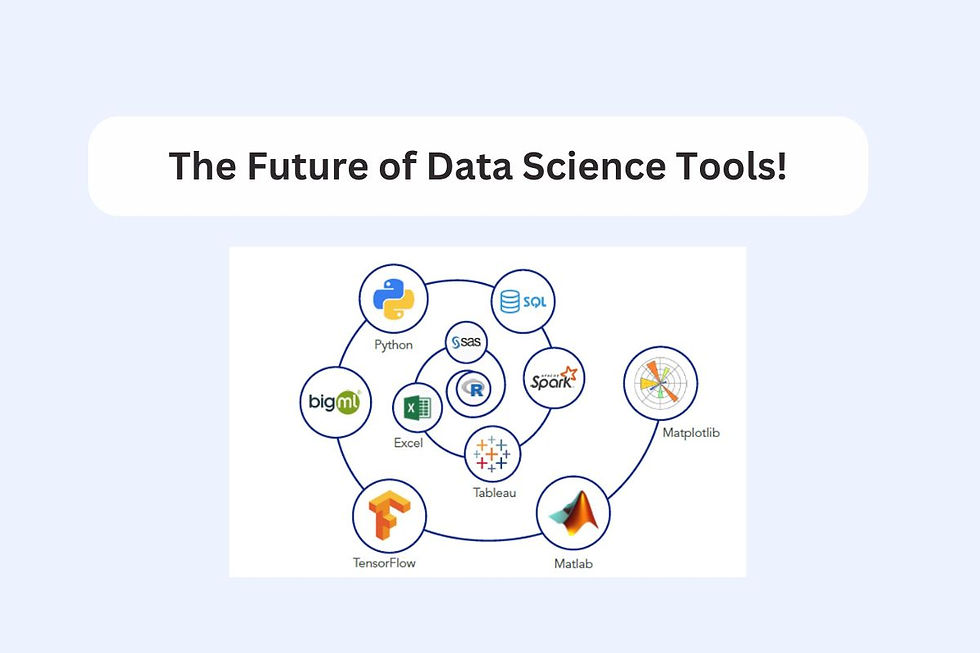Data Science in Healthcare: Advantages and Applications
- archi jain

- Oct 18, 2024
- 4 min read

Introduction
Data science is transforming various industries, and healthcare is no exception. By harnessing vast amounts of data, healthcare professionals can improve patient outcomes, streamline processes, and enhance overall efficiency. This article explores the advantages and applications of data science in healthcare, making it easier to understand how it benefits both patients and providers.
What is Data Science?
Data science combines statistics, computer science, and domain expertise to extract meaningful insights from structured and unstructured data. In healthcare, this can involve analyzing patient records, clinical trials, genetic information, and even wearable device data. The goal is to use this information to improve decision-making and patient care.
Advantages of Data Science in Healthcare
1. Enhanced Patient Care
Data science enables healthcare providers to offer personalized care. By analyzing a patient’s medical history, genetic information, and lifestyle factors, providers can tailor treatments to meet individual needs. This personalized approach can lead to better outcomes and improved patient satisfaction.
2. Predictive Analytics
One of the most significant advantages of data science is its ability to predict future events. For instance, predictive analytics can identify patients at risk for certain conditions, allowing for early intervention. This proactive approach can prevent complications and reduce healthcare costs.
3. Improved Operational Efficiency
Data science helps healthcare organizations optimize their operations. By analyzing workflow patterns, patient flow, and resource allocation, hospitals can streamline processes, reduce wait times, and improve overall efficiency. This not only benefits patients but also enhances staff satisfaction.
4. Drug Discovery and Development
Data science accelerates the drug discovery process by analyzing vast amounts of data from clinical trials, patient records, and even genetic data. Machine learning algorithms can identify potential drug candidates faster and more accurately than traditional methods, reducing time and costs associated with bringing new drugs to market.
5. Population Health Management
Data science allows healthcare providers to analyze data across populations to identify trends, risk factors, and outcomes. This information is crucial for public health initiatives and can guide interventions aimed at improving community health. For example, understanding the spread of diseases can help in planning vaccination campaigns or health education programs.
6. Enhanced Diagnostics
Machine learning algorithms can analyze medical images (like X-rays, MRIs, and CT scans) with high accuracy. These algorithms can assist radiologists by highlighting anomalies and suggesting potential diagnoses, leading to faster and more accurate diagnoses.
7. Telemedicine and Remote Monitoring
With the rise of telemedicine, data science plays a crucial role in monitoring patients remotely. Wearable devices collect real-time data on vital signs, activity levels, and other health metrics. Analyzing this data allows healthcare providers to track patient health outside the clinical setting, ensuring timely interventions when necessary.
Applications of Data Science in Healthcare
1. Electronic Health Records (EHR)
EHR systems store vast amounts of patient data. Data science techniques can analyze this information to identify trends, improve patient care, and streamline administrative tasks. For example, predictive models can forecast patient admissions based on historical data.
2. Clinical Decision Support Systems (CDSS)
CDSS use data science to provide healthcare professionals with evidence-based recommendations at the point of care. These systems analyze patient data and clinical guidelines to suggest appropriate treatments, reducing errors and improving outcomes.
3. Genomic Data Analysis
The explosion of genomic data has opened new frontiers in personalized medicine. Data science techniques are essential for analyzing genetic information, allowing for targeted therapies that consider an individual’s genetic makeup. This can be particularly beneficial in oncology, where treatments can be tailored to specific tumor characteristics.
4. Healthcare Fraud Detection
Data science is also valuable in identifying fraudulent activities within the healthcare system. By analyzing billing patterns and patient records, machine learning algorithms can flag anomalies that may indicate fraud, helping to reduce losses and improve resource allocation.
5. Patient Engagement and Retention
Data science can enhance patient engagement through personalized communication and targeted interventions. Analyzing patient behavior and preferences allows healthcare providers to develop strategies that improve adherence to treatment plans and encourage regular check-ups.
6. Social Determinants of Health (SDOH)
Data science helps in understanding the social factors that affect health outcomes. By analyzing data related to income, education, and living conditions, healthcare providers can develop targeted programs to address disparities and improve community health.
Challenges in Implementing Data Science in Healthcare
While the advantages and applications of data science in healthcare are significant, there are also challenges to consider:
Data Privacy and Security: Protecting patient data is paramount. Strict regulations, like HIPAA in the U.S., govern how healthcare data can be used and shared.
Integration with Existing Systems: Many healthcare organizations use outdated systems that may not easily integrate with new data science tools.
Interpreting Data: Data scientists must collaborate closely with healthcare professionals to ensure that insights are understood and actionable.
Cost and Resources: Implementing data science solutions can be expensive and may require specialized skills that are in short supply.
Conclusion
Data science is reshaping the healthcare landscape, offering numerous advantages that enhance patient care, operational efficiency, and public health initiatives. For those looking to make a mark in this field, enrolling in the best data science training course in Noida, Delhi, Gurgaon, and other locations in India can provide the necessary skills and knowledge. As technology continues to evolve, the potential applications of data science in healthcare are limitless. By overcoming existing challenges, healthcare providers can harness the power of data to improve health outcomes and transform the way care is delivered. Embracing data science is not just a trend; it is a necessity for the future of healthcare.








Comments